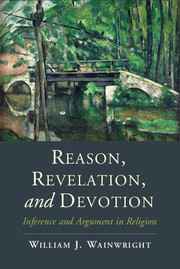Book contents
- Frontmatter
- Dedication
- Contents
- Acknowledgments
- Introduction
- 1 Four Examples of Religious Reasoning
- 2 The Purposes of Argument and the Person-Relativity of Proofs
- 3 Religious Reading and Theological Argument
- 4 Passional Reasoning
- 5 The Role of Rhetoric in Religious Argumentation
- 6 Reason, Revelation, and Religious Argumentation
- 7 Theology and Mystery
- Conclusion
- Notes
- Index
5 - The Role of Rhetoric in Religious Argumentation
Published online by Cambridge University Press: 05 December 2015
- Frontmatter
- Dedication
- Contents
- Acknowledgments
- Introduction
- 1 Four Examples of Religious Reasoning
- 2 The Purposes of Argument and the Person-Relativity of Proofs
- 3 Religious Reading and Theological Argument
- 4 Passional Reasoning
- 5 The Role of Rhetoric in Religious Argumentation
- 6 Reason, Revelation, and Religious Argumentation
- 7 Theology and Mystery
- Conclusion
- Notes
- Index
Summary
Philosophy's Quarrel with Rhetoric
Western philosophy has tended to drive a wedge between rational discourse and persuasion. Rational discourse is the domain of philosophy. Persuasion, on the other hand, is the domain of rhetoric, and rhetoric is epistemically and morally suspect. Thus, Plato argues that rhetoric isn't a species of knowledge, but rather a mere “knack” or “technique” (empeiria). The rhetorician has mastered the devices and stratagems that enable him to speak persuasively but lacks a theoretical understanding of their nature, of the psychological and social mechanisms that ensure that some techniques will be effective and others not. Furthermore, the rhetorician's aim is not to produce knowledge or true opinion but to convince his audience of the truth of his assertions, whether they are in fact true or not. And because the rhetorician's aim is persuasion, its mastery involves a command of those devices that make speakers persuasive. These include sound arguments. But they also include plausible but specious proofs, ad hominem attacks, appeals to one's hearers’ baser emotions and prejudices, the creation of a favorable personal impression whether it is warranted or not, verbal style and ornament, and so on. The rhetorician's means of persuasion are thus both rational and nonrational. And this is morally problematic. Genuine arts aim at the good of their subject matter. The aim of medicine, for example, is to produce health. By contrast, rhetoric is not concerned with the spiritual and moral well-being of its potential audiences but only with persuasion. The rhetorician qua rhetorician is indifferent to whether he produces knowledge or true opinion, on the one hand, or false opinion, on the other, and to whether he persuades us by employing reason and appealing to our nobler sentiments or convinces us by using specious arguments and pandering to our baser desires. The philosopher wishes to benefit the souls of her hearers and so employs rational means to produce knowledge or true belief. The rhetorician as such is not concerned with what would benefit us.
But of course, matters are not so simple. Plato himself concedes (in the Phaedrus) that the first defect could be remedied. The second cannot. But the force of his complaint is mitigated by at least three things. First, Plato himself is a master of rhetoric as he must surely have recognized.
- Type
- Chapter
- Information
- Reason, Revelation, and DevotionInference and Argument in Religion, pp. 84 - 102Publisher: Cambridge University PressPrint publication year: 2015

